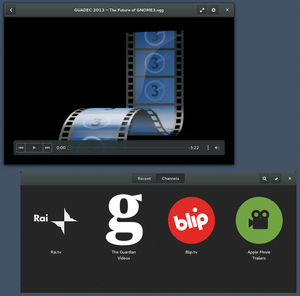Totem (media player)
 |
|

GNOME Videos 3.12
|
|
| Developer(s) | The GNOME Project |
|---|---|
| Initial release | February 2003 |
| Stable release | 3.24.1 (12 April 2017) |
| Preview release | 3.24.0 (21 March 2017) |
| Repository | git |
| Written in | C, Python, Vala |
| Operating system | Unix-like |
| Platform | GTK+, Clutter |
| Type | Media player |
| License | GNU General Public License |
| Website | |
GNOME Videos, formerly known as Totem, is a media player (audio and video) for the GNOME computer desktop environment. GNOME Videos uses the Clutter and GTK+ toolkits. It is officially included in GNOME starting from version 2.10 (released in March 2005), but de facto it was already included in most GNOME environments. Totem utilizes the GStreamer framework for playback, though until version 2.27.1, it could alternatively be configured to use the Xine libraries instead of GStreamer.
GNOME Videos is free and open-source software subject to the requirements of the GNU General Public License.
Until recently there were two distinct versions of Totem, though the difference was not visible at the user interface level. One of them was based on GStreamer, which is a plugin-based multimedia framework. This version has superior extensibility and supports a larger variety of media formats. The other one was based on xine, which is a regular multimedia library. At the time the latter had better encrypted DVD playback support, DVD navigation support and could play some files the GStreamer version couldn't handle. Due to enhancements in GStreamer including the ability to play back encrypted DVDs, the Totem development team dropped support for the xine backend.
Totem is closely integrated with the GNOME desktop environment and its file manager, GNOME Files. This includes generating thumbnails of video files when browsing in Nautilus and a video plugin for Netscape-compatible browsers (e.g. Firefox).
Thanks to a large number of plugins developed for GStreamer, Totem is able to play all mainstream media formats, both open and proprietary ones. It also understands numerous playlist formats, including SHOUTcast, M3U, XML Shareable Playlist Format (XSPF), SMIL, Windows Media Player playlists and RealAudio playlists. Playlists are easily manageable using drag-and-drop features.
...
Wikipedia
